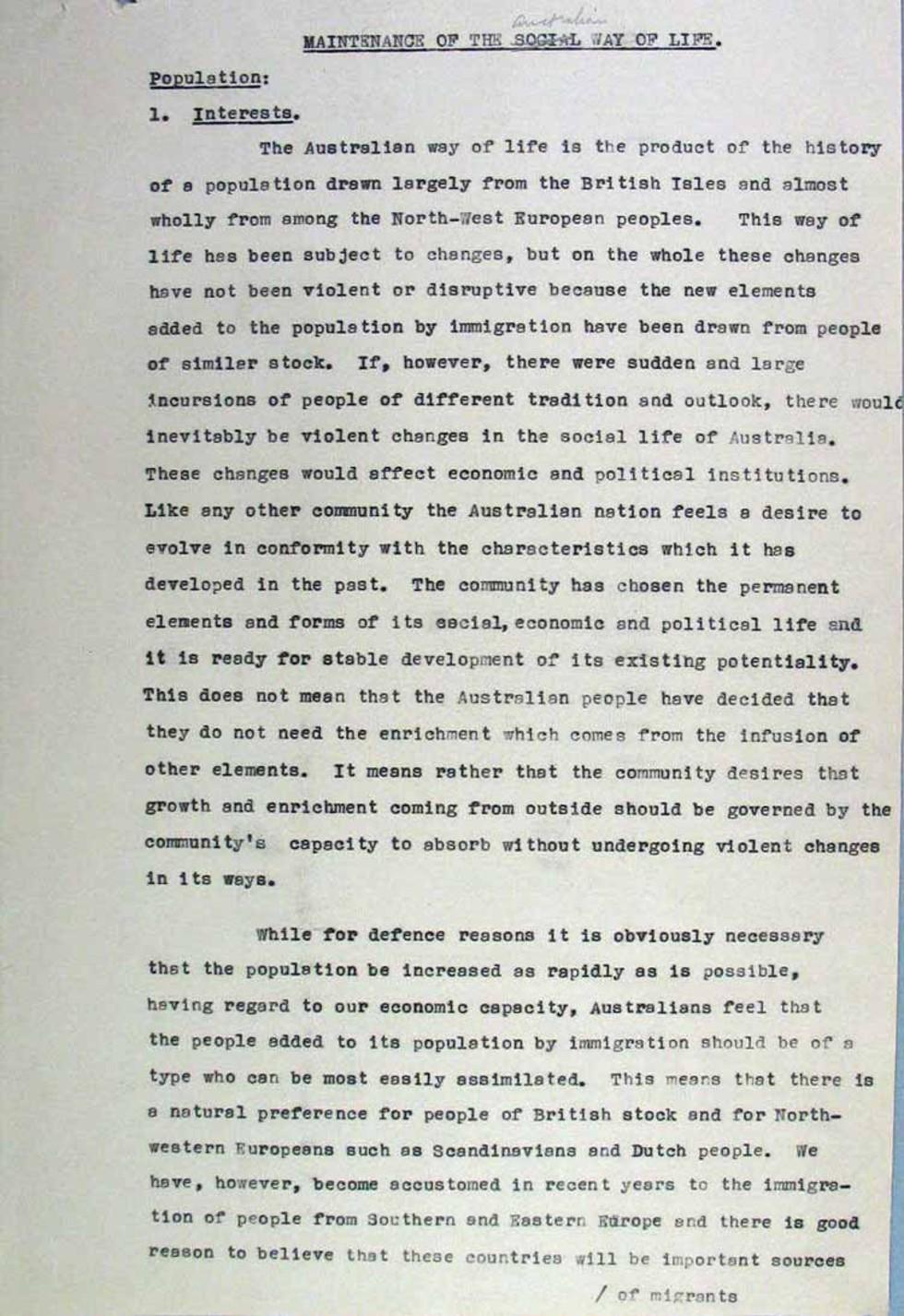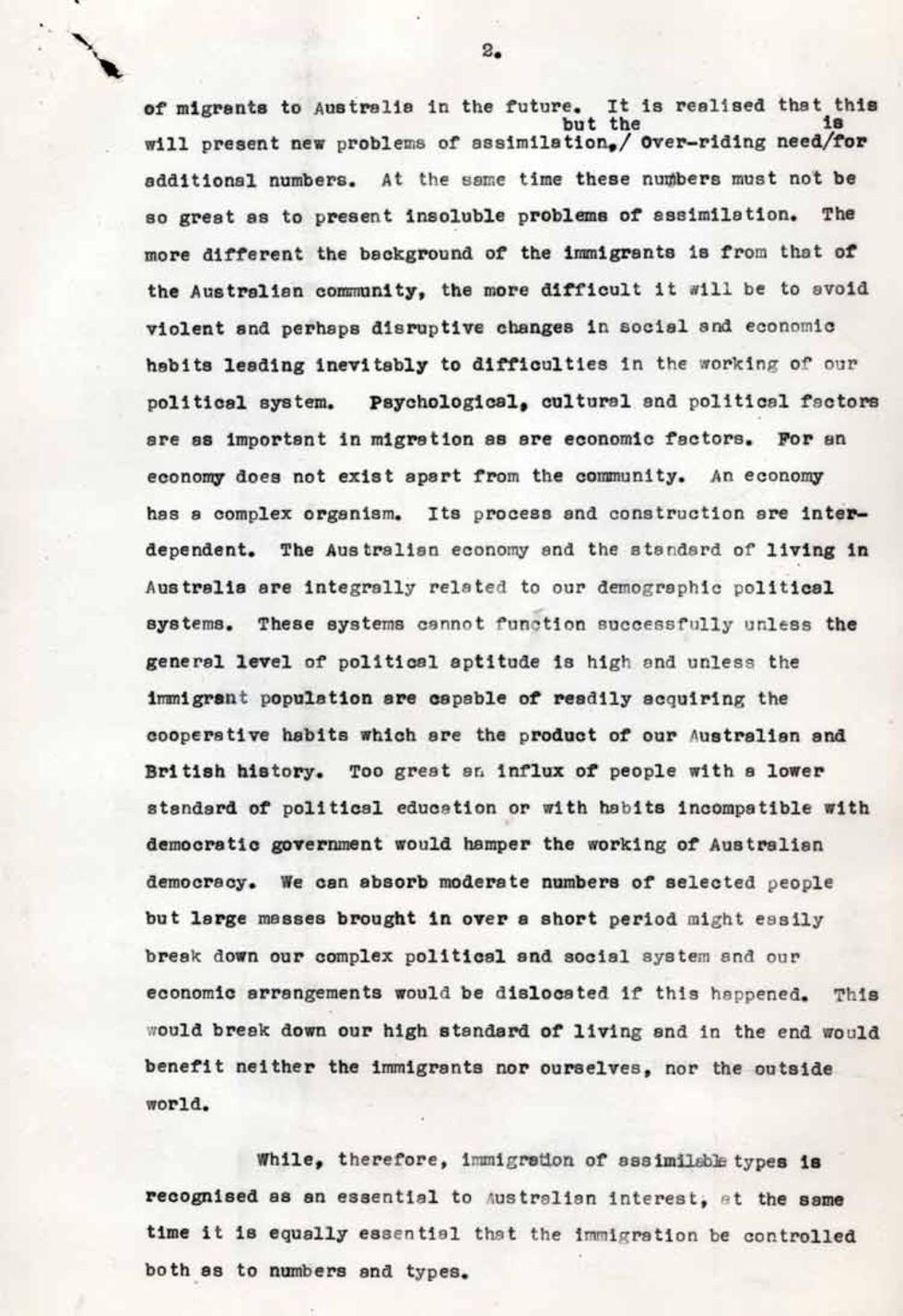



Aboriginal and Torres Strait Islander people should be aware that the National Archives' website and collection contain the names, images and voices of people who have died.
Some records include terms and views that are not appropriate today. They reflect the period in which they were created and are not the views of the National Archives.





[Page 1.]
[Underlined heading:] MAINTENANCE OF THE SOCIAL [word crossed out, replaced with 'Australian'] WAY OF LIFE.
[Underlined subheading:] Population:
[Underlined subheading.] 1. Interests.
The Australian way of life is the product of the history of a population drawn largely from the British Isles and almost wholly from among the North-West European peoples. This way of life has been subject to changes, but on the whole these changes have not been violent or disruptive because the new elements added to the population by immigration have been drawn from people of similar stock. If, however there were sudden and large incursions of people of different tradition and outlook, there would inevitably be violent changes in the social life of Australia. These changes would affect economic and political institutions. Like any other community the Australian nation feels a desire to evolve in conformity with the characteristics which it has developed in the past. The community has chosen the permanent elements and forms of its social, economic and political institutions. Like any other community the Australian nation feels a desire to evolve in conformity with the characteristics which it has developed in the past. The community has chosen the permanent elements and forms of its social, economic and political life and it is ready for stable development of its existing potentiality. This does not mean that the Australian people have decided that they do not need the enrichment which comes from the infusion of other elements. It means rather that the community desires that growth and enrichment coming from outside should be governed by the community's capacity to absorb without undergoing violent changes in its ways.
While for defence reasons it is obviously necessary that the population be increased as rapidly as is possible, having regard to our economic capacity, Australians feel that the people added to its population by immigration should be of a type who can be most easily assimilated. This means that there is a natural preference for people of British stock and for Northwestern Europeans such as Scandinavians and Dutch people. We have, however, become accustomed in recent years to the immigration of people from Southern and Eastern Europe and there is good reason to believe that these countries will be important sources
/ of migrants
[Page] 2.
of migrants to Australia in the future. It is realised that this will present new problems of assimilation, but the over-riding need is for additional numbers. At the same time these numbers must not be so great as to present insoluble problems of assimilation. The more different the background of the immigrants is from that of the Australian community, the more difficult it will be to avoid violent and perhaps disruptive changes in social and economic habits leading inevitably to difficulties in the working of our political system. Psychological, cultural, and political factors are as important in migration as are economic factors. For an economy does not exist apart from the community. An economy has [sic] a complex organism. Its process and construction are interdependent. The Australian economy and the standard of living in Australia are integrally related to our demographic political systems. These systems cannot function successfully unless the general level of political aptitude is high and unless the immigrant population are capable of readily acquiring the cooperative habits which are the product of our Australian and British history. Too great an influx of people with a lower standard of political education or with habits incompatible with democratic government would hamper the working of Australian democracy. We can absorb moderate numbers of selected people but large messes brought in over a short period might easily break down our complex political and social system and our economic arrangements would be dislocated if this happened. This would break down our high standard of living and in the end would benefit neither the immigrants nor ourselves, nor the outside world.
While, therefore, immigration of assimilable types is recognised as an essential to Australian interest, at the same time it is equally essential that the immigration be controlled both as to numbers and types.
[Page 3.]
[Handwritten annotation in top left corner:] Records. [underlined] PHF Migration Policy
[Handwritten at top of page in black ink:] Draft section for purposed pamphlet by E.A Dept. [Department of External Affairs] on Aust. [Australian] Foreign Policy. March 1944.
[Stamped in purple ink 'EXTERNAL AFFAIRS RECORDS', with illegible handwritten signature and record number '364/554/2/1-14' written inside stamp.
[Stamped in purple ink 'REC'D' [received], '10 MAY 1944'.]
[Underlined subheading.] 2. Principles of Population Policy
The first principle of Australian population policy is that the best additions to our population are the Australian-born. To this end the present Government has given much attention to the development of social services in order to make it easier for people to rear families.
The second principle is that immigration should be encouraged provided the immigrants are of such types that they contribute to our economic development, that they are likely to fit in to Australian social, economic and political systems and that the number of immigrants is not so great as to throw a serious strain upon our economic capacity.
The third principle follows from the second: it is that we should preserve on the whole the ethnic composition which has been developed during the century and a half of our history. Our social, cultural, economic and political characteristics are all of European origin. Out of mixed European elements, predominantly British, sharing distinctively Australian experiences, we have created a unified and self-conscious national community. Large masses of immigrants of non-European stock would create insoluble social and political problems. The development of Australia would be radically changed and might be thrown into chaos by such immigration. ['The', crossed out.]
The fourth principle is a necessary corollary of the third. We recognise that there is a pressure of emigration from some countries, especially some parts of Asia. We consider that this pressure is due not to a desire on the part of overcrowded peoples to have their homes so much as to a necessity forced upon them by poverty. It is partly for this reason that we have espoused international policies for the raising of standards in the less developed parts of the world. In our view the real problem is not over-population, but under-development. We do not believe that emigration can cure this evil of poverty and under-development. Emigration can only spread, not solve this problem. What is needed is a positive and concerted international
[Page 4.]
policy of welfare among all peoples in these lands. The Australian policy in regard to international economic arrangements is one which would tend towards improvement of conditions in backwards areas.
Learn how to interpret primary sources, use our collection and more.
